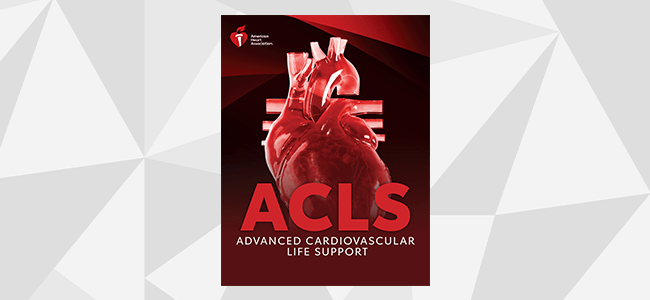고급 심폐혈관소생술(ACL)
(ACLS) Provider Course
The AHA's Advanced Cardiovascular Life Support (ACLS) provider course builds on the foundation of lifesaving Basic Life Support (BLS) skills, emphasizing the importance of continuous, high-quality CPR. The hands-on instruction and simulated cases in this advanced course are designed to help enhance skills in the recognition and intervention for adult cardiac arrest, stroke, and other cardiopulmonary emergencies through early recognition and time-sensitive intervention by high-performance teams. The AHA's ACLS course has been updated to reflect science and education from the American Heart Association 2025 Guidelines for Cardiopulmonary Resuscitation and Emergency Cardiovascular Care.
This is the International version of the ACLS Course. The training materials have been adapted to include metric units of measure and other references that apply to students outside the U.S. and Canada.

Supported Languages
국제 영어
Formats Available
- Instructor-led training (ILT)
- Blended learning – HeartCode® ACLS + hands-on skills session training
- 소생술 품질 개선® (RQI®)
- Apply the basic life support (BLS), primary, and secondary assessments sequence for a systematic evaluation of adult patients
- 응급대응팀(RRT) 또는 응급의료팀(MET)의 운용이 환자의 경과를 어떻게 개선할 수 있는지 논의
- Discuss early recognition and management of ACS, including appropriate disposition
- Discuss early recognition and management of stroke, including appropriate disposition
- 심장마비 또는 복합 소생술 상황을 초래할 수 있는 느린맥 및 빠른맥의 인지
- 심장마비 또는 복합 소생술 상황을 초래할 수 있는 느린맥 및 빠른맥의 조기 관리 수행
- 고성과 팀의 구성원 또는 리더로서 효과적인 커뮤니케이션을 솔선수범
- 전체적 팀 성과에 팀 역학이 미치는 영향 인지
- 호흡정지 인지
- 호흡정지에 대한 조기 관리 수행
- 심장마비 인지
- Perform prompt, high-quality BLS, including prioritizing early chest compressions, ventilation, and integrating early automated external defibrillator (AED) use
- Perform optimized management of cardiac arrest until termination of resuscitation or transfer of care, including post–cardiac arrest care
- Evaluate resuscitative efforts during a cardiac arrest through continuous assessment of cardiopulmonary resuscitation (CPR) quality, monitoring the patient’s response, and delivering real-time feedback to the team